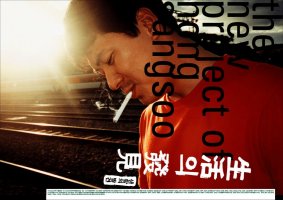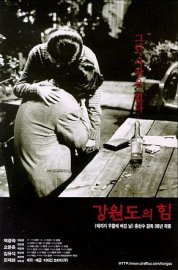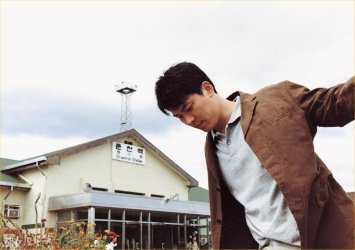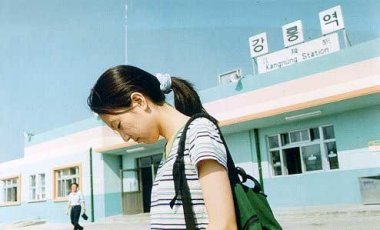Notes from the Hong Sang-soo Retrospective
By Adam Hartzell
Being a huge HONG Sang-soo fan ever since I saw The Power of Kangwon Province (1998) at one of the many film festivals in San Francisco, I knew I just had to attend the HONG Sang-soo Retrospective at the University of California, Irvine, organized by Kyung Hyun Kim. I immediately took the days off from work. The opportunity to see his films, be around others who appreciate his work, and, perhaps, have a chance to simply say thank you to The Master was an opportunity I could not miss.
 Being that my day job would not allow for me to take off two consecutive Thursdays and Fridays, I had to choose to attend only one of the weekends. Since I had a strong interest in the papers presentation and the Q&A with Hong, I only attended the final weekend, when Turning Gate (2002) and Oh, Soojung! (Virgin Stripped Bare By Her Bachelors, 2000) were being shown. (Sadly, this means I still have only viewed The Day A Pig Fell Into The Well (1996) once. And that was when I was really tired after an all day interview for a therapist position at University of Wisconsin, Madison.) As has been discussed on this site's board, Hong is not talked about enough, not nearly at the level and volume of discourse his work deserves. The Retrospective and the papers presented, in my opinion, were an attempt to rectify this injustice. Moderated by David James, a professor at the University of Southern California who co-edited, along with Kyung Hyun Kim, the first book in the United States specifically on Korean film, Im Kwon-Taek: The Making of a Korean National Cinema, four papers were to be presented. David Bordwell from the University of Wisconsin, Madison, was unable to make his flight. David James read Bordwell's abstract in absentia.
Being that my day job would not allow for me to take off two consecutive Thursdays and Fridays, I had to choose to attend only one of the weekends. Since I had a strong interest in the papers presentation and the Q&A with Hong, I only attended the final weekend, when Turning Gate (2002) and Oh, Soojung! (Virgin Stripped Bare By Her Bachelors, 2000) were being shown. (Sadly, this means I still have only viewed The Day A Pig Fell Into The Well (1996) once. And that was when I was really tired after an all day interview for a therapist position at University of Wisconsin, Madison.) As has been discussed on this site's board, Hong is not talked about enough, not nearly at the level and volume of discourse his work deserves. The Retrospective and the papers presented, in my opinion, were an attempt to rectify this injustice. Moderated by David James, a professor at the University of Southern California who co-edited, along with Kyung Hyun Kim, the first book in the United States specifically on Korean film, Im Kwon-Taek: The Making of a Korean National Cinema, four papers were to be presented. David Bordwell from the University of Wisconsin, Madison, was unable to make his flight. David James read Bordwell's abstract in absentia.
Although the papers presentation was not held in a large lecture hall, the room was filled beyond capacity with many choosing to stand along the perimeter of the room. It was wonderful to see such a turn out for the papers. Most of the crowd was Korean-American, but there was a larger percentage of non-Koreans than I've seen at the two Korean Film Festivals in the San Francisco Bay Areas.
I wanted to give those who did not have the privilege to attend an idea of the ideas presented in the papers. I did not bring a tape recorder so I am transcribing from the rash of notes I could jot down. There was some difficulty hearing some of the presenters, especially for those in the back of the room. The high volume of information each presenter wanted to pass on within a limited amount of time caused the presenters to often speak too fast to retain much of what was said. Add to this the poor acoustics in the room and we all were pretty much only able to get soundbites here and there. All that said, I could have misheard the intent of some points of the papers, so please check out the actual papers when and if they are published. (In what publication, I don't know. But I'll let everyone know when I do.)
The following is a collage of the issues addressed in the specific papers:
Chris Berry, University of California, Berkeley: "Full Service Cinema: The Korean Cinema Success Story"
Chris Berry is credited with being heavily responsible for introducing the West to Chinese Cinema. Recently, Berry has chosen to focus on Korean Cinema. His paper appears to argue that Korean Film has done so well in the past years because it is a well-rounded industry that is not reliant on one particular area of the industry. Whereas Hong Kong focused aggressively on commercial films and Taiwan art films, Korean cinema crosses deftly through almost all genres.
 Berry sees Korea taking an uncharted route to international success. Three points stand out amongst this new approach:
Berry sees Korea taking an uncharted route to international success. Three points stand out amongst this new approach:
* Genre films rather than just art films have been pushed on the International art-house circuit, e.g., Shiri (KANG Je-gyu, 1999) and Take Care of My Cat (JEONG Jae-eun, 2001)
* Selling of screenplay rights are emphasized over selling of import rights, e.g., Hi, Dharma (PARK Cheol-kwan, 2001) and My Sassy Girl (KWAK Jae-yong, 2001).
* Feature releases are focused on Asia and East Asia rather than North America/Europe, e.g., JSA (PARK Chan-wook, 2000) and Friend (KWAK Kyung-taek, 2001)
Berry mentioned an interesting factoid underscoring the latter point. A Chinese internet poll, thus, one that would represent its educated young population, asked respondents what country they would most like to visit. Sixty-one percent said Korea. This represents a major shift in the interests of the next generation of Chinese citizens.
Berry cautions us when talking about the success of the Korean Film industry and how it might imply that HONG Sang-soo is less important to that success. Hong is a part of this whole of "Full Service Cinema". His films provide an inroad for new viewers to explore more Korean films than just his. Many of us here on Darcy Paquet's webpage are a testament to this. One of Hong's films is just as likely to have generated our interest in Korean film as Shiri and My Sassy Girl.
If more time had permitted, I would have wished to ask Berry two things about his research that will, perhaps, be addressed in his final paper:
1) In a previous article that I have not read, Berry had addressed two obstacles for Korean Cinema's success. (That article is "Introducing 'Mr Monster': Kim Kiyoung and the Critical Economy of the Globalized Art-House Cinema," in Post-Colonial Classics of Korean Cinema, ed. Chungmoo Choi (Irvine: Korean Film Festival Committee, University of California, 1998), 46.) Julian Stringer, in his chapter of Im Kwon-Taek: The Making of a Korean National Cinema entitled "Sopyonje and the Inner Domain of National Culture," summarizes those obstacles.
On the one hand, {Berry} contends, an increased concentration of ownership in the U.S. and European art-house sectors resulted in a general unwillingness to take risks with internationally "unknown" product, meaning negotiating overseas exhibition rights for their work. On the other hand, Korea had a hard time establishing a "new" identity for itself within highly competitive image markets because of its inability to differentiate its films from those produced by other East Asian countries (pg. 157).
My first question would be, how come these obstacles are no longer obstacles for Korea?
2) What is missing in this "Full Service Cinema" and are there any inherent problems in such an approach? That is, what are the Blind Spots and Achilles Heels of the Korean Film industry?
David Bordwell, University of Wisconsin, Madison: "Hong Sangsoo: Beyond Asian Minimalism"
What the abstract David James read from appeared to point out were the facets of Asian Minimalism and Hong's extension of these facets. Examples of facets of Asian Minimalism are muted actions, minimal narration that leaves the spectator to infer action, and long takes. The paper appears to argue that Hong revises minimalism to express fresh works. Hong's "cryptic and elliptical" structure becomes rich and more complex because of his repetition. "The routine becomes profound."
Kyung Hyun Kim, University of California, Irvine: "The Awkward Flaneur: Reading the Fictions of Hong Sangsoo and Kim Sang-ok
Kim presented his paper as centered around one particular scene in Turning Gate (2002). In this scene, Kyongsoo has recently stepped off the train to follow, some might say to stalk, Seonyoung. Stopping for dinner by himself, Kyongsoo is caught red-faced gawking at the bare legs of a female patron sitting next to him with her boyfriend. This scene began with the couple's dialogue implying some friction in the couple's relationship. The woman did not call the boyfriend while in school in Seoul. When the woman catches Kyongsoo staring at her legs, she motions to her boyfriend who laughs. Kyongsoo uses his acting abilities in an attempt to save face by perpetrating as if he was  looking at the picture behind the woman rather than her legs. When Kyongsoo carries this charade to the actual picture itself, walking over
to it as if oblivious to the young woman, her boyfriend uses this as an opportunity to reclaim "ownership" of his girlfriend by attacking Kyongsoo with sentences peppered with "assholes" and "fucking(s)." This language has even greater power in this context since Kyongsoo is visibly this young man's elder. The boyfriend perpetuates the male privilege of The Gaze rather than responding to the offense of The Gaze.
looking at the picture behind the woman rather than her legs. When Kyongsoo carries this charade to the actual picture itself, walking over
to it as if oblivious to the young woman, her boyfriend uses this as an opportunity to reclaim "ownership" of his girlfriend by attacking Kyongsoo with sentences peppered with "assholes" and "fucking(s)." This language has even greater power in this context since Kyongsoo is visibly this young man's elder. The boyfriend perpetuates the male privilege of The Gaze rather than responding to the offense of The Gaze.
Kim finds this scene a vivid display of Hong's tropes. Hong brings many awkward moments to us in his films. Hong's single takes make these awkward moments even more disruptive within the viewer. Couple this with the fact that it is The Gaze that is being addressed here while we the viewers are Gaze-ing at the screen, we end up further aligned with the awkwardness of this entire moment.
Although Kim notes that others have commented on these disruptive moments in Hong's films, Kim argues that Hong carries these states even further to the state of humiliation. Each Hong protagonist is a "Hero of Futility." "The more {the Hero} tries, the gap between the Hero and the World widens."
If I understand Kim correctly here, this argument provides an understanding of the imperative spoken throughout Turning Gate, "Even though it's difficult being human, let's not become monsters, ok?" The more the protagonists try to be human, the more they risk becoming less so. Constant progression towards humiliation can lead us to become monsters.
Hong "refuses to grant us pleasure at all," Kim said later. Yet, even later, Kim adds that there is a pleasure in viewing Hong's unwillingness to provide us with the cinematic cliches of pleasurable denouements.
Akira Lippit, University of California, Irvine: "SOO/HONG/SANG"
Lippit's presentation began with several apologies that are as poignant as the arguments he makes and are part of what influenced me to begin my overview of the papers presentation with disclaimers of my own. Since Lippit, like myself, does not know Korean, he is reliant on subtitles that he's aware might not really be representing what is said. (As Hong himself would later note. He writes for Koreans and for his interest in the way of Korean words. Only later when he presents them to the international community does he realize how much of his dialogue is difficult to translate if not impossible.) Lippit prefaced the presentation of his paper that much of his thesis works off the subtitles and he is aware that the real Korean dialogue could be quite dissonant.
 Lippit appears to be focusing on how the questions are disconcerting to the characters and the viewer and how these questions are extremely difficult to answer. For example, the Policeman's question to Jisook in The Power of Kangwon Province - "Are you scared of people?"; Soojung's question to Jaehoon in Oh, Soojung! - "Do you still drink alot?"; Kyongsoo's director's question to Kyongsoo in Turning Gate - "Even though it's difficult being human, let's not become monsters, ok?" Lippit argues these unanswerable questions represent a "failure of words, perhaps of language." These questions are disruptive, reminding us of what is untranslatable, even for those of us who apparently speak the same language.
Lippit appears to be focusing on how the questions are disconcerting to the characters and the viewer and how these questions are extremely difficult to answer. For example, the Policeman's question to Jisook in The Power of Kangwon Province - "Are you scared of people?"; Soojung's question to Jaehoon in Oh, Soojung! - "Do you still drink alot?"; Kyongsoo's director's question to Kyongsoo in Turning Gate - "Even though it's difficult being human, let's not become monsters, ok?" Lippit argues these unanswerable questions represent a "failure of words, perhaps of language." These questions are disruptive, reminding us of what is untranslatable, even for those of us who apparently speak the same language.
Lippit finds the latter of the questions mentioned above most fascinating. The question, with the "ok" at the end forming it as a question, is actually an imperative. In fact, Kyongsoo repeats the line as an imperative twice in the film. I don't recall Lippit making this point, but it appears that these questions aren't really questions at all, hence why they are unanswerable. They are imperatives, directives, hopes, wishes, fears, nihilisms.
Alcohol, an ever-present prop in Hong's films that it becomes a character in and of itself, is another facet of Lippit's paper. He cites a Los Angeles Times review that said Hong's films consist of "characters who drink too much and say too little." Lippit argues that drinking in Hong's films appears to be a defense for not speaking, yet, as evidenced from the amount of vomiting in the films, something always lurks from within each character that needs to be released. I guess we could say, extending this argument, that the disconcerting questions are verbal vomit.
Hong would later tell us how he feels it is easier to get to know someone while drinking with them. He'd also tell us, in response to Kim's comments, that he does want to please us. But Hong is also interested in how people interpret his films. He doesn't seem to bludgeon us with a point of view that is the only possible interpretation. His films are open to interpretation like relationships are open to transforming us beyond our transference. The papers presented at this Retrospective underscore the font of intellectual thought Hong's films provide for Koreans and non-Koreans.
I'd like to publicly thank all those involved in making this Retrospective possible, the professors on the panel, the students who helped in the organizing, the curious and passionate folks who formed the audience, and to HONG Sang-soo himself. I had a completely enriching and rewarding experience. Plus, I had a lot of In and Out burgers.
Irvine, October 2002